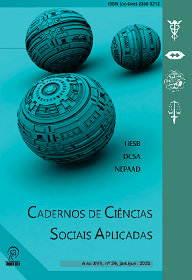The concept of welfare in conventional economic theory
DOI:
https://doi.org/10.22481/ccsa.v17i29.6668Keywords:
Economia do bem-estar, Racionalidade, UtilitarismoAbstract
This paper analyses the welfare concept used by the Welfare Economic Theory. The main objective is to emphasize that the definition of well-being, both that used by the traditional economy and the modern welfare economy, is based on the rational and maximizing behaviour of the individual, which has little relation to the real behaviour of this individual in society. The main theoretical contributions of the welfare economy are presented, highlighting the utilitarian and Vilfredo Pareto ideas. The Pareto conceptual refinement was not able to incorporate important aspects that influence the behaviour of the individual. Still, his argument for optimality and economic efficiency predominates in orthodox economic thinking and beacon many welfare policies.












